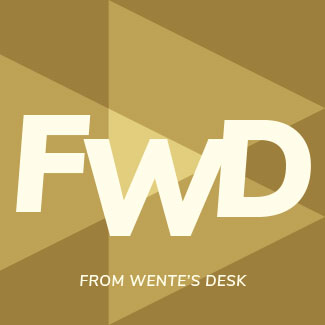Reading and reflecting this summer

Moments of reflection often come to me through reading. Though many might view me as shaped solely by my scientific training, I have always been drawn to poetry. Recently, I enjoyed an early summer morning in the company of the late Dr. Ed Wilson, by way of the poetry collection that was shared with guests at his memorial service in May. With their unique voices, it is captivating how some poets render ordinary things, especially those in the natural world, so much more extraordinary with the power of their words.
In this brief anthology, I came upon “The Lake Isle of Innisfree,” by William Butler Yeats. It reads:
I will arise and go now, and go to Innisfree,
And a small cabin build there, of clay and wattles made;
Nine bean-rows will I have there, a hive for the honey-bee,
And live alone in the bee-loud glade.
And I shall have some peace there, for peace comes,
dropping slow;
Dropping from the veils of the mourning to where
the cricket sings;
There midnight’s all a glimmer, and noon a purple glow,
And evening full of linnet’s wings.
I will arise and go now, for always night and day
I hear lake water lapping with low sounds by the shore;
While I stand on the roadway, or on the pavements grey,
I hear it in the deep heart’s core.
In Yeats’ words, I felt “summer” fully; in his sense of longing for calm, the pull of the lake and its water lapping the shore, of bees buzzing in the day and crickets singing into the night.
These natural pleasures call to me, too, when summer arrives. My husband, Chris, and I enjoy tending to our summer tomato garden, harvesting its fruit for endless salads, pastas, and freezing away for the long winter. We sit among the flowers in what feels like every color and variety possible that fill the restored Ellen Biddle Shipman formal garden at the President’s House, watching the bees buzz, smelling the lavender, and hearing the Carolina wrens sing. And often with that floral summer backdrop, we read. To me, there is hardly anything better than a moment in quiet, surrounded by nature, and a chance to read a good book.
I welcome your recommendations for books, both fiction and nonfiction, that you have read this year or have added to your list for summer. And I offer you a few from my recent reading list for your summer, too:
“Tom Lake” by Ann Patchett: Ann Patchett is one of my favorite authors, and I have read (more than once!) nearly everything she has written. I enjoyed her most recent novel, “Tom Lake,” earlier this year. Three young adult daughters return home to their parents’ cherry farm in Michigan during the COVID-19 pandemic, and over the course of a summer harvest, their mother shares the story of her youth and early career as an actress. Patchett seamlessly weaves past and present together in rich and vivid detail. If you prefer audiobooks, here’s a tip: This one is read by Meryl Streep at Audible!
“The Women” by Kristin Hannah: Having read several of Hannah’s previous works, I am looking forward to tackling “The Women” this summer. In this most recent novel, Hannah’s setting is the Vietnam War, where she focuses on the stories of women who were there, and one woman in particular — a nurse named Frances “Frankie” McGrath who is unprepared for the horrors of the trauma unit but like so many who volunteers in the Vietnam era, finds her way, heroically, in impossible circumstances.
“The Hours/Mrs. Dalloway” by Michael Cunningham and Virginia Woolf: Some of you may be familiar with Cunningham’s novel “The Hours,” which won the 1999 Pulitzer Prize for Fiction and was later made into a movie that starred Nicole Kidman, Meryl Streep, and Julianne Moore. “The Hours” told the story of Virginia Woolf as she wrote her novel, “Mrs. Dalloway,” and connects it to the lives of two women in different time periods, the 1940s and the 1990s. In “The Hours/Mrs. Dalloway,” Cunningham republishes his work and renders it alongside its inspiration, Woolf’s “Mrs. Dalloway,” so that each novel can illuminate the other.
“Demon Copperhead” by Barbara Kingsolver: Like Patchett, Kingsolver’s many works of fiction have unspooled over decades for me. Kingsolver was a co-recipient of the 2023 Pulitzer Prize for Fiction for “Demon Copperhead,” a novel inspired by Charles Dickens’ “David Copperfield.” It is set in rural Virginia amidst the opioid crisis that has devastated mountain towns in Appalachia. While a heavy read, in which some characters seem doomed to repeat the hard histories of past generations, Kingsolver manages to weave light and hope into the lives of her characters, as well as lessons for all of us.
As is my summer practice, the next issue of From Wente’s Desk is planned for August. A recap of posts from this past year is provided here. And if you would like a copy of the poems I mentioned from Dr. Wilson’s memorial service, we have some available in the President’s office in Reynolda Hall; please stop by and pick one up! My very best wishes, and enjoy your summer!
- August 24, 2023: A Framework, A Mirror, A Call to Action
- September 21, 2023: Telling Our Wake Forest Story
- October 13, 2023: A Guide in Moments of Crisis: ‘For Humanity’
- November 8, 2023: Expanding Our Narrative Through Memorialization
- December 13, 2023: Lending Our Light to Others
- January 25, 2024: Embracing Our Values and Building Trust in Challenging Times
- February 22, 2024: Renewing and Building New: A Reynolda Campus Space Planning Update
- March 21, 2024: ‘Love Everyday’: Remembering Dr. Ed Wilson
- April 25, 2024: Making Time for Moments of Connection
- May 22, 2024: A Toast to the Class of 2024
Categories: From Wente's Desk
